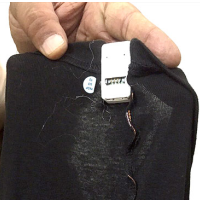Medical Admission Test Delayed as Technology Helps Students Cheat
 Gadgets stitched in a candidate's undergarment, being displayed by a policeman in Rohtak (photo: HT)
Gadgets stitched in a candidate's undergarment, being displayed by a policeman in Rohtak (photo: HT)
The admissions of 630,000 students could be delayed after the All India Pre-Medical and Pre-Dental Entrance Test (AIPMT) was scrapped by the Supreme Court on Monday following large-scale irregularities. The CBSE said it was not possible to re-conduct the examination within a month as directed by the court and has sought three months’ time instead.
The original test was held on May 3, in which many tech-savvy students were allegedly found cheating by getting answers through electronic devices smuggled into test centres across the country.
In its investigation, the Haryana police found at least 44 students had used electronic devices to cheat. They found that at least 72 mobile phones were used to make 358 calls to centres around the country. 700 vests with listening devices sewn in were allegedly distributed to students. The fee for the providing the whole kit was Rs 15 lakh-Rs 20 lakh ($23,600-$31,500), the police said.
“Even if one undeserving candidate, a beneficiary of such illegal machination, though undetected, is retained in the process it would be in denial of the claim of more deserving candidates," a two-judge SC bench said, after an activist and AIPMT candidates filed a petition asking for the exam to be annulled.
The AIPMT is one of the most prestigious medical entrance exams in the country, providing entry to 15 percent of seats in government medical colleges. The remaining seats are decided by state-level entrance exams, though some states have decided to secure all admission through the central tests.
According to the Times of India, 99.4 percent of all AIPMT candidates fail each year. With such a tiny chance of passing, it comes as no surprise that some students feel the need to use any means available.
If you are rich, or the stakes are high enough, technology is an option. According to Scroll.in, this is often provided by an established syndicate.
One such network was exposed in Hyderabad last December, involving the all-India Railway Recruitment Exam. The police arrested 30 people, including Mahender Kumar, a railway employee who is alleged to have been the leader of a cheating ring. The police also seized earpieces, Bluetooth devices, laptops and mobile phones. Students allegedly sent Kumar questions over Whatsapp and his team outside dictated answers to candidates. The fee for this service, officials claimed, was Rs 5 lakh ($7,900) per student.
These syndicates often have analysts who solve the paper faster than students can, then relaying the answers back to the students writing the exam.
Clothing can also be used to carry sophisticated devices, as it was in AIPMT. At a Staff Selection Commission exam in Haryana last November, police arrested 37 candidates wearing high-tech jackets and spectacles with cameras attached to them to transmit visuals of the question papers. Some candidates had even put their phones in their underwear, with Bluetooth chips inserted in their ears.
With technology becoming ever smaller and innovative, candidates often seem to be one step ahead of the authorities. The CBSE will have to restore confidence in its testing procedures, and show that it has learnt from the last test with new measures to ensure the AIPMT is fair.
- Karan Singh
To Learn More:
SC scraps All India Pre-medical Test: CBSE told to conduct fresh exams within 4 weeks (Firstpost)
CBSE seeks 3 months to hold AIPMT re-test (Times of India)
From bluetooth to Whatsapp, technology prompted Supreme Court order on medical entrance retest (by Mridula Chari, Scroll.in)
Testing times for lakhs of students after SC orders fresh AIPMT exams (Hindustan Times)
- Top Stories
- Controversies
- Where is the Money Going?
- India and the World
- Appointments and Resignations
- Unusual News
- Latest News
- India College Chain’s Expansion into U.S. Draws Opposition from Massachusetts Officials over Quality of Education
- Milk Shortages in India Tied to Release of New Movies Featuring Nation’s Favorite Stars
- Confusion Swirls around Kashmir Newspaper Ban in Wake of Violent Street Protests
- Polio-Free for 5 Years, India Launches Vaccine Drive after Polio Strain Discovery
- New Aviation Policy Could Increase Service, Lower Ticket Prices






Comments